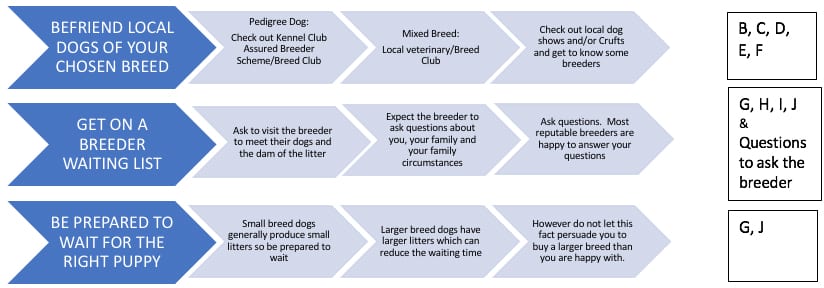Buying a puppy should be a joyful experience but the existence of puppy farms, (where puppies are bred on a commercial basis) often makes potential puppy owners very unsure of how to find their next companion. The following are some of the most important basic steps.
A. Research breed (pedigree). If mixed breed (e.g. labradoodle, cockerpoo etc.) your research should be extended to all the breeds in the mix, if possible. This research can be carried out on the Kennel Club This is to ensure that the puppy is suitable for your family. The initial research is a really important step because far too many potential puppy owners buy a puppy on the spur of the moment or because it looks cute! All puppies grow up and you need to find a puppy that fits in with your family life and circumstances.
- Find out the original purpose of the breed (e.g. many terriers hunted vermin, hounds were bred for speed, etc.)
- Find out the exercise/grooming requirements for your preferred breed to ensure they fit in with your family life.
- Find out the expected life span of your breed and research any health problems that are known for that breed/mixed-breed.
B. Once you have chosen a breed find people in your local community who own the breed/mixed breed and get to know them and their dog(s) as they can be a fount of knowledge. Ask them if you can walk their dog sometimes. This will help you to gauge temperament and sociability.
C. If you are buying a pedigree dog use the Kennel Club website to find breeders who are Kennel Club Assured, as these breeders are inspected regularly by the Kennel Club. Do NOT assume that just because your puppy can be registered by the Kennel Club that the breeder is checked. If they are not bona fide Kennel Club Assured breeders they are NOT subject to any inspections. Currently, breeders who breed more than 3 litters per year MUST be licenced by their Local Authority. Beware of breeders who breed more than 2 breeds or who have puppies available all year round.
D. Ask at your local veterinary practice if they know of any local breeders for your chosen breed especially if the breed that you want is a mixed breed. E.g. labradoodle or similar.
E. Every pedigree breed (and some mixed breeds) have a breed clubs. Visit their websites and speak with the Club secretary, as they can provide details of local shows where your chosen breed is being exhibited by breeders.
F. Visiting local dog shows (do not forget Crufts (Pedigree) and Scrufts (All About Dogs) is a great way to find breeders who care about your chosen breed and the future of that breed. Once their show classes are completed most breeders are happy to talk about their breed and any planned puppies.
G. Expect the breeder to have a waiting list, especially for those dogs who only produce small litters, e.g. West Highland White Terrier and other small breeds.
H. Ensure that you see the puppy with the mother and the rest of the litter. Breeders usually welcome visitors once the puppies are 6 weeks old and by that stage they should be playful and interacting with their mother and siblings.
I. A responsible breeder will provide new puppy owners with background on the socialisation that has already taken place.
J. Expect the breeder to ask you a lot of questions. You may even be required to fill in a puppy questionnaire so that breeder has some information about your family and your circumstances before you can be placed on their waiting list.
Buying a puppy is a serious undertaking and it is important that you choose the right puppy for your family; after all, the life-span of a dog is anywhere between 10 and 18 years and the right dog will give companionship, love and devotion unreservedly. Ownership does involve total commitment and many responsibilities, which include grooming, training, health care and exercise, but the joy of finding the right companion is the only reward you will ever need.
For more details and/or help on buying your new puppy, in the first instance, please email:
Sue is a breeder and exhibitor of Rhodesian Ridgebacks and West Highland White Terriers and has owned and loved dogs all her life. She is also passionate about using her knowledge gained over many years help others to find the right puppy from a reputable breeder.
Remember:
“He is your friend, your partner, your defender, your dog. You are his life, his love, his leader. He will be yours, faithful and true, to the last beat of his heart. You owe it to him to be worthy of such devotion.” – Anon
QUESTIONS TO ASK THE BREEDER
- Is there a contract for sale? Does the breeder require a deposit and is the deposit refundable in the event of a change in either parties’ circumstances? The contract should detail both the breeders’ and your responsibility to the puppy. This can include clauses that
a. Require you take the puppy to your vet for a health check,
b. Detail any guarantees given by the breeder in the event of any genetic conditions being discovered (usually up to the age of 12 months),
c. List any Kennel Club endorsements (restrictions) that the breeder has placed on the puppy’s records (pedigree dogs only),
d. Require you to contact the breeder if your circumstances change and you are no longer able to care for your dog.
e. Require you to look after the health and wellbeing of the dog for the span of its life.
- Does the breeder provide written advice on training, exercise, worming and immunisation?
- Will my puppy’s Kennel Club registration certificate (pedigree dogs) be included in my puppy pack? You will need this certificate to transfer the puppy into your own name. This certificate MUST be signed by the breeder to enable the transfer.
- Does the puppy come with a pedigree detailing the puppy’s ancestry?
- Have the sire/dam had any health tests? (some are mandatory if the breeder is a member of the Kennel Club Assured scheme) If so, will copies be provided to me in the puppy pack?
- What vaccinations will my puppy have had and will the puppy be microchipped? All puppies MUST by law be microchipped by 8 weeks of age. All breeders should give the first vaccinations and some will also include the second. It is also important to ensure that you are given the puppy’s health card with written details of ALL vaccinations and treatments (e.g. worming, flea etc) that have been given to the puppy.
- Will my puppy have any insurance? Kennel Club breeders can offer you four free weeks of the Kennel Club Pet Insurance which starts from the moment you collect your puppy.
- Has the puppy been raised in the house, with other dogs/children/household noises?
- What food will the puppy be weaned onto and does the breeder provide a diet sheet and some of the food for the puppy?
- Does the breeder offer lifetime support/help for the puppies that they breed? Reputable breeders will offer lifetime support for puppies they have bred and will always be pleased to hear from their new owners.







